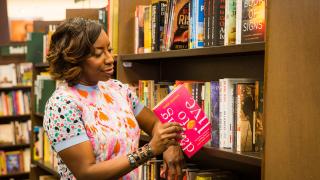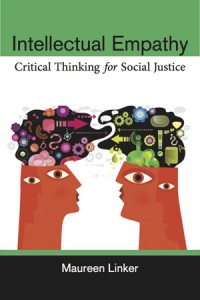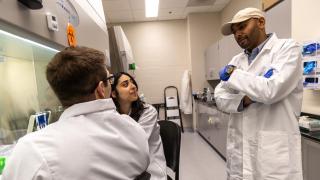

And that’s the idea.
Linker, an associate professor of philosophy at University of Michigan-Dearborn, asks her students enrolled in Philosophy 399: Special Topics to assess their own social biases.
“It’s definitely uncomfortable at first,” she said. “I have to establish some trust and ground rules, but at the end of the day, we’re all here to learn from each other. We’re all a work in progress.”
By identifying and examining their own individual stereotypes and biases, Linker helps her students see how they are related to structural inequalities that bolster social injustice.
“Education should include self-understanding so you can become a better citizen, a better parent and a better leader,” she said.
Linker is no stranger to the topic of social justice, but she struggled to find a textbook that could adequately set the tone for classroom discussion. That’s why Linker recently authored her own book, “Intellectual Empathy: Critical Thinking for Social Justice,” which provides a method for facilitating discussions of socially divisive issues.
The book, published by University of Michigan Press, will be available December 15. Linker expected her book to hit shelves this coming spring, but thanks to a subvention grant funded by UM-Dearborn’s Office of the Provost and the U-M Office of Research and Sponsored Projects, the book was fast tracked.
“As the decision to fast track this book was being made, the acquisitions editor at the University of Michigan Press confided to me that, ‘I'm not exaggerating when I tell you that it is one of the most important books that I have had the privilege of publishing in my career,’” said Martin Hershock, dean of the College of Arts, Sciences, and Letters. “I was not at all surprised. The quality of Professor Linker’s mind, the richness of her classroom and her devotion to her craft, to her students and to the university are exemplary. Maureen’s work models what our metropolitan mission is at its very best—a pathway to self knowledge and an invitation to engage with and appreciate others.”
Throughout the book, Linker draws on her decade-long tenure of teaching critical thinking across metropolitan Detroit.
“Our region is a microcosm of nearly every social issue in the United States,” she said. “There’s a divide between suburban and urban living, and a great deal of localization in which people hardly ever leave their community. I have students who grew up in Livonia and have never been to the DIA (Detroit Institute of Arts).”
Her classroom serves as an inclusive environment in which a diverse group of students can gain the necessary tools to engage in positive dialogue about social differences.
“The skills acquired through ‘Intellectual Empathy’ have proven to be significant for students who pursue careers in education, social work, law, business and medicine,” Linker said.




